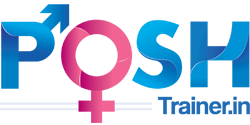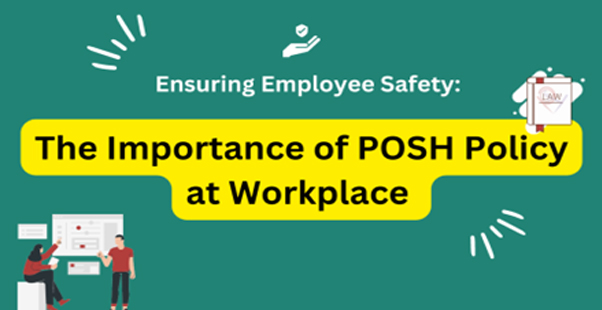Introduction
The PoSH (Prevention of Sexual Harassment Act) law aims to empower women in the workplace to combat sexual harassment. The Prevention of Sexual Harassment (PoSH) Act has aided many women in obtaining justice in incidents of sexual harassment in the workplace throughout the years. However, it has also become a menacing weapon for some women who use fraudulent PoSH accusations to extort money from their organization’s management. Employees are sometimes unaware of their rights, which can lead to unwelcome situations of sexual misconduct. Furthermore, many businesses are unsure how to set up a competent POSH complaint resolution mechanism or form an internal complaints committee. Hiring an external member for the internal complaints committee is also a common problem that businesses encounter. All of these issues may be solved by providing PoSH training to employees and management through a competent legal company.
Why is Posh training needed?
What is the necessity for PoSH awareness training for a company? This is a question that many business owners frequently ask. The legal definition of sexual harassment provides the solution to the question. It is mandatory for every company to conduct PoSH training for all their employees.
The majority of men are unaware that the conduct they are casually doing at the office may fall within the ambit of PoSH law. The same is true for female workers, who are unaware that numerous behaviours or statements that make them feel uncomfortable are covered under the PoSH Act and are criminal. As a result, any company must provide staff with PoSH training.
PoSH training is also necessary to ensure that all workers are aware of the Act’s requirements. As a result, incidences of sexual harassment will be reduced, as men will be more mindful of their actions. This might potentially result in an increase in the number of complaints for a few months, as the female workforce may disclose occurrences that they previously did not record owing to a lack of information of the Act.
In addition, the act has a number of compliance requirements for businesses, failing which their licences may be cancelled or they may face severe fines.
The most urgent demand for PoSH training (India) is in the management and HR departments of businesses. These are the company’s policy enforcement bodies, and hence have a significant effect on how a sexual harassment complaint is handled. The training required by the legislation is for management to design a harassment prevention policy for the organisation, as well as the formation of the mandated internal complaints committee. They must be properly trained on the processes for appointing an external member in the internal s committee. Even the HR department must be informed of how to handle complaints and how to check fake complaints before forwarding them to the ICC. Companies must also disclose information on complaints settled by there IC to the on a yearly basis.
PoSH in Start-ups
- According to a recent poll, around 60% of IT company owners have experienced or know someone who has experienced sexual harassment at work.
- In terms of economic involvement and opportunity, India was placed 149th out of 153 nations examined.
- Here’s what entrepreneurs and professionals had to say about the Prevention of Sexual Harassment at Workplace (POSH) Act in India.
The good side of being a start-up, is that the inherent joy and creativity helps the firm to maintain communication light, open-channelled, and fluent. Start-ups aren’t afraid to think outside the box, and they’ve come up with innovative ways to raise awareness about the problem of sexual harassment.
In an interview with Inc42, ecommerce giant Flipkart discussed how it uses caricature movies and animated clips to teach employees about the possibility of sexual harassment at work. The films are reported to be shared with the team via the company’s intranet, allowing staff to view the content on their own time and go back to it if they have any questions.
Similarly, Zomato claims that its workplaces contain a number of banners and visual communication to promote awareness and urge employees to get help Zomato India is estimated to have approximately 3,700 employees, with 45 percent of them being female. Last year, the Foodtech firm implemented a gender-neutral parenting policy, which, according to a company spokeswoman, assisted Zomato in building an equal opportunity workplace.
When it comes to culture, PayPal has launched a number of initiatives aimed at creating a safe and pleasant work environment for women. One of these programmes is the Follow-a-Leader programme, which allows mid-career female engineers to shadow senior firm executives for a period of time in order to improve their leadership abilities. Mentorship has been identified as a major factor in women feeling empowered in the workplace on several occasions.
Many women networking firms, such as Sheroes and Leap.club, have emerged as a result of this demand for mentoring and a network of working women professionals. PayPal also maintains a women’s network, which aims to provide more educational and networking opportunities for the company’s female employees both in and out of the workplace.
Culture
Startups are notorious for their laid-back work environments and flat hierarchies, where frenetic work days intersect with leisure time, and your professional circle includes friends as well as co-workers. People tend to hang out with their co-workers as a result of this. In such a setting, defining the boundaries of a workplace and what constitutes sexual harassment becomes incredibly challenging.
One of the biggest surprises for most start-up executives, , is learning that non-compliance with the POSH Act might result in the termination of a company licence. Given the size of the stake, one could anticipate start-ups to respond more positively.
Why does the POSH act not protect males, as it does any regulation that protects women, is a common question among start-up workers. Many male workers, it appears, are unaware of the seriousness of the problem.
Young workers, millennials, and Gen Z employees, , have a better understanding of POSH law than older employees or those with a corporate history. They recognise the significance of such policies and recognise that they are required.
However, he acknowledged that some start-up employees may fail to comprehend that swearing is an unpleasant gesture.
“We have to rectify numerous cultural norms that have gone unchecked till now,” Chahal remarked.
Even though gender parity is still a long way off (estimated at 99.5 years), safe workplaces are one of the most important prerequisites for women’s economic involvement and possibilities. India was placed 149th out of 153 nations polled in the World Economic Forum’s Global Gender Gap Report 2020 in terms of economic participation and opportunity. This is a decrease from India’s 142nd place finish in 2018.
In a patriarchal culture such as India, women are already at a disadvantage due to the disproportionate weight of home and care tasks that they bear in comparison to males. Women’s engagement in the workforce is discouraged by these discrepancies, which are compounded by a dangerous workplace.
Legal Compliance
It is a legal mandate as per the PoSH Act, 2013. Non compliance may lead to penalty upto Rs 50,000 and even revocation of license in case of repeated non-compliance. It is mandatory to include the details of PoSH cases in the Annual Report
Want to conduct POSH Training for your employees or ICC members?
Shivani Bose is a PoSH certified trainer and has been instrumental in implementing PoSH across industries. She is an external panel member of ICC for various companies. She has conducted several workshops on Gender sensitization and PoSH awareness and had counselled several clients facing mental wellness and gender bias issues.
We provide training related to POSH for both employees and ICC members. In addition, we also help in empanelment for external panel members. For further details, please get in touch with us at info@proudhr.com




